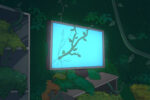Global warming is one of the most controversial issues in America today, despite all the evidence that proves it as fact and not just a subject of debate. While older generations tend to think of the concept as some kind of political motive, most people understand it as a pressing issue that will shape the entirety of our future unless we make changes to mend it.
Just last year, the Climate Reality Project reported in their article “Majority Rules: American Attitudes on Climate in 7 Stats” that despite the political feud in America, statistics show that the majority want and demand that we start taking action in mending the damage that continues to be done to our planet. They report that 63 percent of Americans find climate change personally important to them, and three in four millennials think we should try to stop climate change.
If research shows that most of America’s population finds this to be as pressing of an issue as it is, what is stopping us from making change? What must be done to prove to everyone that climate change is very real, and very terrifying?
Reading.
Authors from all over the world are using their talents as means of activism to promote awareness of the threats that climate change poses and the things we all must do to prevent the degradation of our beautiful planet. A professor at the University of South Carolina, Dr. Eli Jelly-Schapiro, has arranged a syllabus that groups these novels together to relay one essential point: literature from all over the world is working to keep it all intact.
1. “The Great Derangement” by Amitav Ghosh
Amitav Ghosh is an Indian author who dedicates his talents to sharing the threat our planet faces because of climate change, and our inability to prevent it thus far. Author of “In an Antique Land” Ghosh’s most recent novel, “The Great Derangement,” asks the reader, “Are we insane?”
In it, Ghosh explores the reasons why throughout history, and up until today, we as inhabitants of the Earth do so little to prevent its destruction. Exploring the influences of politics, literature and ethics, Ghosh begs his readers to see the detrimental effects our lack of willingness to prevent global warming will do to the future of our life on Earth.
For more information on Amitav Ghosh and his novels and essays, visit his site here.
2. “The Lamentations of Zeno” by Ilija Trojanow
Trojanow’s novel allows us to get a first-person narration inside the mind of someone who is angry, heartbroken and fearful watching the Earth melt away due to global warming. The novel’s narrator is a glaciologist, Zeno, and his grief at watching the thing he has spent his whole career admiring and learning about melt beneath his feet.
Trojanow explores the same issues as Ghosh and others, but he does so through the very personal and confrontational perspective of a man who knows exactly what he is talking about, and can prove to his reader why global warming is such a real thing, and what the drastic change in weather will do to our world.
Ilija Trojanow himself is a Bulgarian-German author and publisher who is rumored to have been denied entry to the United States due to his public concerns about “global surveillance and the activities of the National Security Agency.” A fearless writer, outspoken about his concerns regarding multiple global issues, including climate change, Trojanow is so passionate about these issues that his fervor seeps through the pages of his novels, demanding his readers to take a closer look at one of the most critical issues the world faces today.
3. “Salvage the Bones” by Jesmyn Ward
Winner of the 2011 National Book Awards in Fiction, Ward’s novel “Salvage the Bones” provides a first-person narration from Esch, a little girl living in Mississippi, and the effects that Hurricane Katrina has on her life and her home state. Ward writes this novel not only to confront readers with the reality of the trauma Hurricane Katrina evoked, but how it left a black, Southern, American family in its wake.
Ward criticizes how this traumatic natural disaster was covered briefly by news outlets, and then pushed to the back of America’s mind shortly after, with little regard for the traumatic, life-changing effects the hurricane had on everyone and everything that was in its path. Symbolic of what America is doing to stop climate change and global warming as a whole, Ward’s novel demands that we take a closer look at what a seemingly distant threat can do when it is suddenly today’s concern, your own concern.
Many reading this — including myself — can admit that we are probably aware and concerned about climate change, but have yet to put our feet down on the matter and start making real change. The recycling bin outside of our doors is not enough, and looking to the news and government to solve the matter has proven futile; as these authors make very clear, as long as climate change is a political issue instead of a moral and personal one, nothing will be done and the Earth will continue to degrade.
An unlikely source, these novels may prove to be the kind of sources Americans need to open their eyes and see that this is an issue to be proactive about, and not reactive to, that change must not come tomorrow, nor in the upcoming years, but today.
















